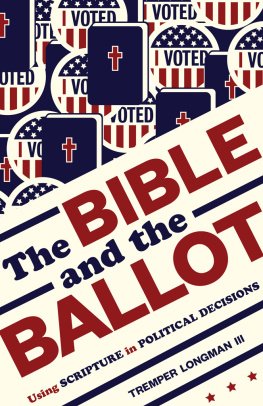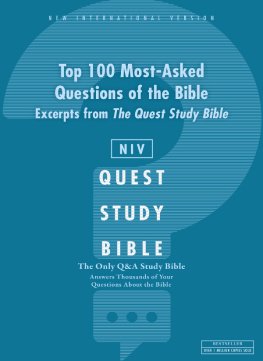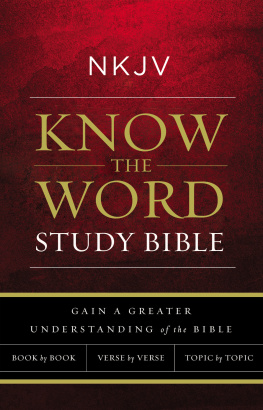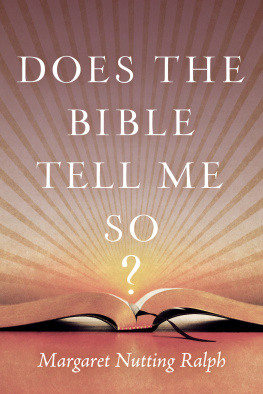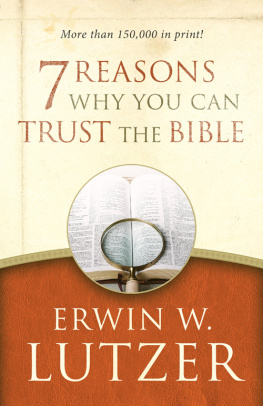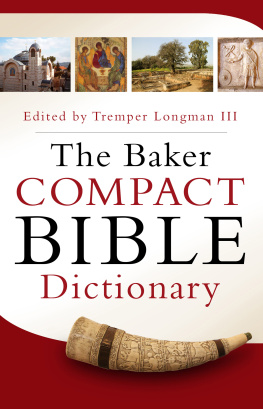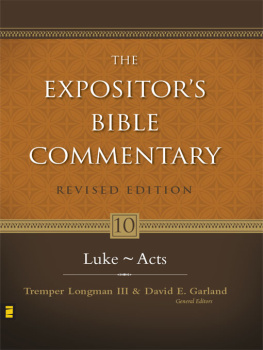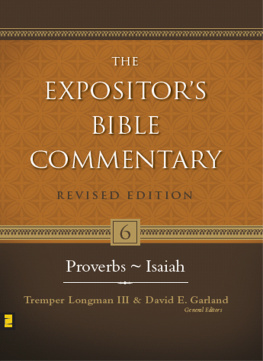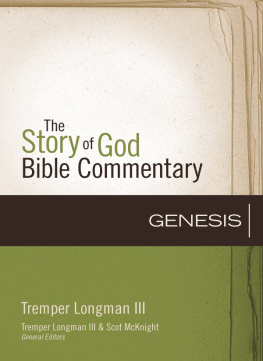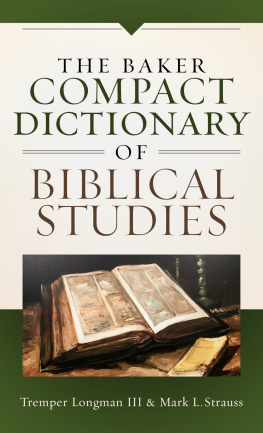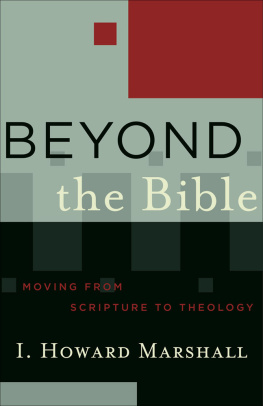The Bible and the Ballot
Using Scripture in Political Decisions
Tremper Longman III
WILLIAM B. EERDMANS PUBLISHING COMPANY
GRAND RAPIDS, MICHIGAN
Wm. B. Eerdmans Publishing Co.
4035 Park East Court SE, Grand Rapids, Michigan 49546
www.eerdmans.com
2020 Tremper Longman III
All rights reserved
Published 2020
262524232221201234567
ISBN 978-0-8028-7734-5
eISBN 978-1-4674-5858-0
Library of Congress Cataloging-in-Publication Data
A catalog record for this book is available from the Library of Congress.
All translations of Scripture follow the 2011 New International Version unless otherwise noted.
To our new granddaughters:
Samantha Tremper Longman (born December 23, 2018)
Lydia Eastwick Longman (born January 8, 2019)
CONTENTS
Why a book on the Bible and public policy?
This book is written for Christians, especially evangelicals, in America. Evangelical Christians for the most part believe that the Bible is Gods revelation to humanity. The church has historically acknowledged the divine origin of Scripture by recognizing it as canon: the standard of our faith and practice. Thus, we want to hear Gods voice on all matters that Scripture addresses, and it is our contention that Scripture speaks to issues of public policy, including the ten issues addressed here: (1) nationalism, patriotism, and globalization; (2) religious liberty; (3) war; (4) abortion; (5) criminal justice; (6) immigration; (7) same-sex marriage; (8) the environment; (9) poverty; and (10) racism.
Right from the start we need to be clear: The Bible does not give us specific public policies. Rather, as we will remind the reader throughout the book, the Bible gives us general principles that we should take seriously as we think through issues of public policy and make political decisions.
My main qualification for writing this book is that I have studied the Bible professionally for over forty years. Im not an expert on public policy, though I consider myself an educated layperson. But then again, my main purpose in this book is not to set specific public policy, but rather to contribute my understanding of the relevant principles to those issues. I do have opinions on how these principles might best be implemented in specific policy decisions at this moment in American history, but for the most part, I try to keep these opinions to myself.
That said, I am straightforward in what I think those principles are, though I also indicate where I think Scripture speaks loudly and where I think it is not as clear. Of course, such judgments depend on interpretation of specific passages in their context. Some today think that finding out what the Bible is saying is as easy as picking it up and reading it without any study or deep reflection. As I will point out, that may be true of the basic message of the Bible, but it certainly is not true of most issues, including the topics discussed here. On the other hand, others believe that the Bible is hopelessly confusing and that people can basically make any argument that they want from the text. This viewpoint is also false. But it does show that besides simply asserting that the Bible is the word of God, we also have to consider how to interpret it in a way that will allow us to hear Gods voice. For that reason, the first part of the book talks about proper interpretation. I would urge readers who are tempted to turn immediately to a later chapter on a topic of special interest that they make sure to read the opening chapters about how to interpret the Bible.
To those who may be tempted to say that my previously held political views shaped my understanding of the biblical principles set forth in this book, I offer the following response. First, I am mindful that our preunderstanding can indeed affect our interpretation, so I read people who disagreed with me. Second, I will simply share that I actually changed my views on some matters as I wrote this book. I wanted the text to shape my understanding, and on a number of occasions I found that, as I studied a topic, I changed my mind. Third, close readers of the whole book will notice that I dont think the Bible ends up supporting any particular partisan view on all the issues discussed in this book.
We live in turbulent times. No matter where you are in the political spectrum, you must acknowledge the divisiveness and vitriol and partisanship that threaten our national and human unity. Because of this, our political rhetoric has become caustic. Each side demonizes the other. Unfortunately, many Christians have participated in name-calling and attempts to shame and humiliate the other side. For this reason, I decided to add at the end of each chapter a section that briefly speaks to what I believe Scripture wants our attitudes and dispositions to be on a particular topic. For example, its hard to speak badly about immigrants, documented or not, if we recognize them as Gods creation and image bearers (not to speak of the fact that many of them are our brothers and sisters in Christ).
What makes this book different from almost any other written recently is that it is a book about the Bible and political decisions. We have had a number of political theologies recently written by insightful Christian scholars and political thinkers.
The topics that I cover in this book are controversial among Christians. I have tried to back up my understanding of specific texts as I derive the relevant principles. I will be honest that I hope to persuade you on these matters. These are Gods principles, I would argue, not mine.
But, of course, I could be wrong on certain of my conclusions. I ask only that my Christian readers feel themselves constrained by Scripture. The worse response would be: He is right about what the Bible says on same-sex marriage, abortion, war, or immigration, but I dont care. Ill keep my own viewpoint on the matter. After all, as pointed out above and described in the next chapter, we hear the voice of God in the Bible and thus the Bible is the churchs canon, its standard of faith and practice.
What I am hoping for most is that you, the reader, will wrestle with Scripture as you consider these issues of pressing importance today in the United States.
TREMPER LONGMAN III
Distinguished Scholar and
Professor Emeritus of Biblical Studies
Westmont College

. Among others, I would highlight Michael Gerson and Peter Wehner, City of Man: Religion and Politics in a New Era (Chicago: Moody, 2010); Tom Wright, God in Public: How the Bible Speaks Truth to Power Today (London: SPCK, 2016); James K. A. Smith, Awaiting the King: Rethinking Public Theology (Grand Rapids: Baker, 2017).
. The one book that in intention is most like mine is Wayne Grudem, Politics according to the Bible: A Comprehensive Resource for Understanding Modern Political Issues in Light of Scripture (Grand Rapids: Zondervan, 2010). I have serious reservations about Grudems approach and many of his conclusions. I will not be doing a running critique of Grudem, but I hope that some who have read his book might consider the perspective I give here. He invites Christians who disagree with him to publish arguments opposing what I say, in the interest of deeper dialogue.
We live in a divisive time in our country. Gone are the days when people of good intentions on different sides of a complicated issue could get together and work out a compromise. Our politicians often seem locked into their respective viewpoints on a multitude of the problems facing our nation and are unwilling to give an inch to the other side. The result is an ineffective government that has not done much to fix or even improve problems associated with immigration, the environment, racism, poverty, and more.

